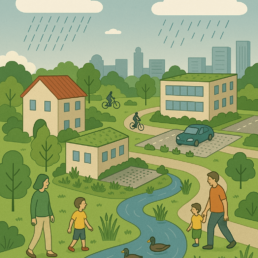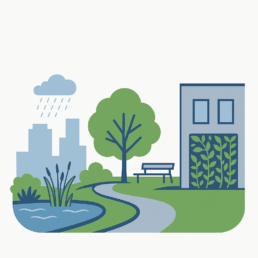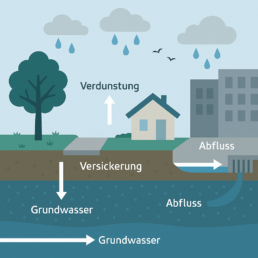Water-sensitive urban development
Rainwater as a resource: new approaches in urban planning
Water-sensitive urban development is a future-oriented planning approach that understands water as a creative and functional element in the urban space, taking into account its natural function as a resource and habitat. Instead of draining rainwater as quickly as possible, water-sensitive urban development pursues decentralized rainwater management measures instead of “end of pipe” measures. In this way, rainwater can be made usable where it occurs – whether through storage, groundwater recharge through infiltration or improvement of the microclimate through targeted provision for evaporation. In this way, water-sensitive urban development not only increases the quality of life in densely populated urban districts and strengthens the local water balance, but also makes an important contribution to flood prevention.
Holistic solutions for sustainable cities
IWR GmbH supports cities, local authorities and private developers in the planning and implementation of concepts for water-sensitive urban development – from urban design and technical planning to implementation in existing buildings. This results in concepts that are both ecologically and economically convincing – individually tailored to the local framework conditions, urban development goals and requirements for climate adaptation and urban quality of life. IWR thinks water further – and makes it visible.

Blue-green infrastructure

Combining nature and technology in urban spaces
The blue-green infrastructure approach combines hydrological elements (e.g. ditches, ponds, swales, trenches) with vegetative elements (e.g. roadside greenery, green roofs or façades). The blue-green infrastructure thus takes water-sensitive urban development one step further by taking into account the synergy effects of water management approaches and green elements. This increases the vitality of the vegetation, creates high-quality recreational and meeting spaces and implements landscape design objectives in the streetscape.
Specialist planning with an understanding of the system and an eye for detail
Together with planning offices in the field of landscape and open space planning, IWR GmbH develops practical concepts for blue-green infrastructure that are tailored to the individual planning boundary conditions. As part of integrated planning, IWR GmbH contributes water management expertise in the context of landscape architecture and urban development, whereby technical and operational requirements are always taken into account. Whether it is a new construction project, an existing district or a renovation project – IWR GmbH not only plans your solution according to the state of the art, but also thinks in higher-level contexts. This results in systems that are robust, efficient and low-maintenance at the same time – water-sensitive urban development as added value for every municipality.
Municipal heavy rain prevention
From hazard identification to action strategy
Extreme heavy rainfall events increasingly lead to flooding of important traffic routes, flooded cellars and damaged infrastructure. Densely populated urban areas are particularly affected. The effects of heavy rainfall are not only determined by the intensity of the rainfall, but also depend crucially on how the rainfall is dealt with, not only in the drainage system, but also on the surface. Effective municipal heavy rain prevention begins with a well-founded risk analysis: flow paths are recorded in order to identify flooding hotspots, protection concepts are developed on this basis and finally individual (structural) measures are derived. Heavy rain prevention should always be seen as a task for the entire municipality.
Tailor-made solutions for cities and municipalities
IWR GmbH supports local authorities in developing and implementing individual prevention concepts. In addition to technical measures such as the creation of emergency waterways and retention volumes, unsealing, land decoupling and property protection, this also includes organizational approaches. The latter include, for example, municipal action plans, strategies for communicating with citizens and adjustments to urban land-use planning. IWR GmbH contributes its many years of experience in municipal consulting – solution-oriented, realistic and with a clear goal: to strengthen resilience through water-sensitive urban development before damage occurs.

Water balance as part of the urban planning design

Hydrological assessment as a basis for planning
Even in the early phase of a construction project, a decisive course is set for future-proof and sustainable stormwater management. The DWA-A 102 / BWK-M 3 series of worksheets and codes of practice, which define the principles for the discharge of stormwater runoff into surface waters, form a central technical basis for this.
Part 4 of the series (DWA-M 102-4: Water balance for the management of stormwater) deals with the local water balance in residential areas and provides the basis for a hydrological assessment of this with a calculation method. As part of the calculation, the breakdown of local precipitation into the central processes of the local water balance – evaporation, groundwater recharge and runoff – is balanced for an undeveloped, natural reference state of an area under consideration. On the basis of this reference state, water management boundary conditions and requirements can be derived and urban development planning variants can be evaluated with a comparative balance. The aim is to use water management measures to approximate the natural water balance as far as possible.
Integrated planning for future-proof neighborhoods
IWR GmbH prepares differentiated water balances in accordance with DWA-M 102-4 in the context of new developments, re-planning or urban planning competitions. Our aim is to achieve the closest possible approximation to the natural, undeveloped state while at the same time ensuring technical, ecological and economic feasibility. Our focus is on sustainable and approvable concepts that actively take into account the natural water balance and provide a basis for the selection of individual water management measures.
Guidelines for water-sensitive urban development in Hesse presented.
Contact
Contact us! We’ll be happy to help with your questions and queries.

